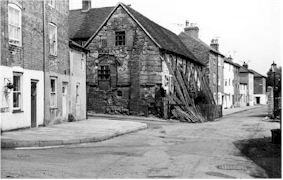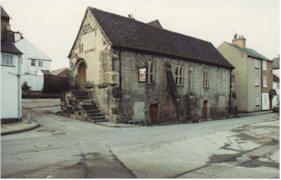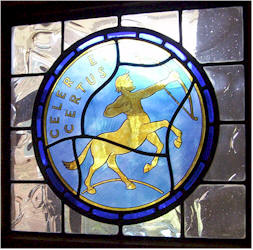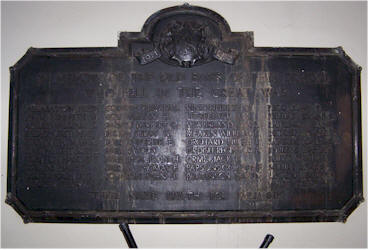| Museum Proposed for the Stables |
May 25th, 2005: PLANS ARE BEING MADE to renovate the Old Stables at Darley Hall to house an information centre for the new Derwent Valley World Heritage Site - reports Nick Clark.
| Once a pupil at Henry Cavendish School, Nick is the son of a genuine Old Centaur from the days at Abbey Street. In conjunction with the Darley Abbey Historical Group he is doing research on Central School and hopes to see a part of the new Heritage Site set aside as a museum in memory of the school. As he says: "I think it's only fitting that these should be used for further representation of the school - preserved in the area where it served so many of Derby's (brighter) lads and itself formed part of the history of Darley village." |
|
The trail of memorabilia winds in unexpected places. When the boys from Darley were moved up to Breadsall Hilltop in September 1958, many other commemorative items moved there, too: a lectern presented to the school c.1948; silver trophies from numerous sporting events and achievements, and more besides.
Nick relates that he remembers the intricately carved oak lectern with the school badge and the names of the fallen Old Centaurs [circa 40 souls] from the Second (?) World War inscribed on it, that once adorned the stage in the Main Hall at Henry Cavendish School.
On a recent visit to the H.C.S. buildings - which in their turn are also now due for demolition - Nick noticed "that in the main entrance foyer to the school is a small survivor of the H.C.S. days - in the form of a small, (approx 15" to 18" square), stained glass window let into the foyer's glazed partitions - depicting the old school badge of a rearing Centaur with a bow and arrow and the school motto in Latin, 'Celer et Certus'." He adds, " This looks a bit incongruous in a building from the 50's/ early 60's, but I believe that this may have been a donation to the new school from the Old Centaurs of the mid-late 50s – although I cannot currently confirm this."
"I am doing my best to have this item preserved, (before it is broken or lost in the demolition works - as a precedent has already been set by the loss of similar items when the former Homelands school was recently flattened). I believe this is an artifact of the history of both Central and Henry Cavendish Schools that is worth saving and have contacted a member of the City Council (Harry Hopkins) with a view to saving it."
Henry Cavendish School also at one time sported an organ which sat across the stage from the lectern and may also have been donated by the Old Boys Association - as it too had the school badge carved into its lid.
The way ahead
Nick deserves all the support he can get from readers of this website. There are many things a museum can do that a website can never do - and vice versa. Please contact Nick if you can add to his information or provide help in locating anything that could be placed in the proposed museum. His email address is: NClark@serco.railtest.co.uk
World Heritage status
Explanation: World Heritage status - ranking the Derwent Valley as a centre of historical significance alongside the Taj Mahal and the Great Wall of China - will focus people's minds on just why the Stables block, as a listed building within the curtilage of the Heritage site, must be conserved - in every sense of that word.
June 23rd, 2005: Follow-up news
I went back to Da Vinci College (used to be Henry Cavendish School) yesterday afternoon and managed to get the attached photographs; two of the little stained glass window depicting the old school badge, (in its second version), and one of another Central School War Memorial, (apparently in bronze or gunmetal), commemorating the fallen old boys from the First World War 1914-1919, which is sited in a corner of the present school hall.
I have to admit that I had completely forgotten this monument after more than 30 years, which looks to be in fairly good condition, (showing definite signs of previous exposure to the weather), if a bit neglected - tucked away on the wall behind a stack of chairs and tables. Who knows, perhaps this 'protection' has helped to keep it in such good order? I think that this may have originally been erected at Hastings Street and could have led a very well-travelled life, following the school through its various changes of site and identity - that are apparently still far from over, as the latest school buildings are already under construction and are due to be opened in about 18 months time.
I was made very welcome by members of the school staff, who were very helpful in assisting with the photography and answering my questions. However, in speaking with the Site Manager, (who has worked at the school for the past 8 years), he tells me that in his time there he has never seen the oak lectern memorial for the fallen Old Centaurs from the Second World War - although he said that he had heard of it. In fact he described it as "...an item that has become something of a thing of myth." It would appear that I'm not the only person to have made enquiries about it over the last few years. (See the lectern page.)
This is a slight worry, as I have previously been informed by the City Council's Conservations Officer that the lectern had been found and is to be incorporated in the new school now being built at the Breadsall Hilltop site. I will now contact Harry again and ask him if I can get a photograph of it - which should be the 'acid test' for its whereabouts, (if they are actually known).
In addition to the above, the old organ (carcass) appears to have suffered a similar fate and is certainly no longer retained at the school site. (Well... it was a lovely piece of oak). I will attempt to press Harry on the whereabouts of this also - although, personally, I feel less optimistic for the survival of this handsome, (but broken), item after such a long time. However, we shall see.....
Regarding the old school's cups and trophies; I didn't want to out-stay my welcome on this occasion - but I will broach this subject during my next visit.
In the meantime, I hope that the attached photographs are of interest to you, (apologies if the quality of the images is not what it might be - blame "operator error", not the equipment), and I'll continue to keep you informed of any developments in what is becoming the 'on-going quest'.
--- MORE NEWS AS IT BECOMES AVAILABLE ---
Darley Village afterthought
Darley Abbey was originally an Augustinian priory, founded by Robert Ferrers, the second Earl of Derby in c1146. The Abbey became one of the most important in Derbyshire, but was surrendered as part of the Dissolution of Monasteries, in 1538, and almost totally obliterated. The section that is now the 'Abbey Pub', (which is the building seen here) is the only remaining building, thought to have been used as the Abbey's guest house for travellers and pilgrims during the 13th century, though some say that it was the monk's refectory. Dendrochronology (tree ring dating) dates the building, or perhaps parts of it that might have been refurbished to c 1429. The building shows evidence of alterations and quite heavy buttressing. The building has been restored as a pub and is very popular. During renovation, 12th century pottery was unearthed.

Letter from Nick - November 8th, 2005
Part of an ongoing discussion on the
fate of old Central School relics.
As yet I've had no further success in tracing the lectern - but I'm not giving up yet and I've asked if the old school (H.C.S. that is) will have a final 'open evening' for past pupils to make one last pilgrimage before it is demolished. If this transpires I'll continue to raise the topic with all relevant parties.
It's nice also to know that the little window was/is (as I had suspected) another gift from the Old Centaurs association.
Re: the old WWI CS memorial. I carried out a bit of research against the names of the fallen Old Centaurs using the Commonwealth War Graves Commission web site. This yielded records for about 80 per cent of the men identified, including one who was an officer (a 2nd Lt in my old regiment, the Sherwood Foresters). Most surprisingly, their average age at time of death - like those involved in the Vietnam war some years later - was only 19 years old. (The average age of a combat soldier in WW2 was about 23). I hope the school still puts a poppy on the memorial for Remembrance Day.
Please give my best regards to Jim Lingard when you see him ["The Mediterranean climate has Warm, Wet, Westerly Winds in Winter" - I've not forgotten].
Re: your teacher memories - I well remember the day that Fred Peake left HCS in about 1972 - I think he moved to either Southgate at Alvaston or Allestree Woodlands for a few years before retiring. It must have been an emotional day for him after so long at the same place and he wouldn't come out of the staff office for the end of term (afternoon) assembly that day. Frank Bridges, who took over as Headmaster from Mr Swaine in the summer of 1968 was a dry old stick, not known for anything other than his strict discipline and "British reserve", but that day he made the whole school raise the rafters to the degree that people must have heard us in the streets outside cheering Fred on his way. Perhaps we should have been worried about that roof....
[Home] Page updated: Friday, 03 August 2007


